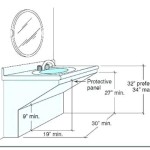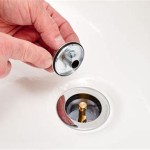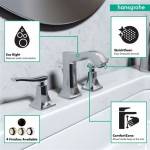How to Stop Smell in Bathroom Sink
Unpleasant odors in the bathroom sink can be a common problem, affecting both hygiene and comfort. Tackling this issue requires addressing several essential aspects, including understanding the cause, implementing effective cleaning practices, and considering preventive measures. This article explores these aspects, providing a comprehensive guide to effectively eliminate and prevent bathroom sink odors.
Causes of Sink Odors
Identifying the root cause of the smell is crucial for effective odor removal. Common causes include:
- Clogged Drain: Food particles, hair, and soap scum can accumulate in the drain, creating a breeding ground for bacteria and mold.
- P-Trap Blockage: The P-trap, a U-shaped section of the drainpipe, holds water to prevent sewer gases from entering the bathroom. Blockages in this area can lead to odor buildup.
- Dry P-Trap: If the P-trap does not have enough water, sewer gases can escape and cause a foul smell.
- Damaged or Leaking Pipes: Cracks or leaks in pipes can allow water and odors to escape, creating an unpleasant smell.
- Mold and Mildew: Moisture and organic matter in the bathroom sink area can promote mold and mildew growth, causing a musty odor.
Cleaning and Deodorizing Techniques
Addressing the cause of the smell is the first step, but regular cleaning and deodorizing practices are essential for long-term odor control:
- Drain Cleaning: Use a drain cleaner or baking soda and vinegar solution to clear clogs and remove accumulated debris.
- P-Trap Cleaning: Use a wrench to detach the P-trap and clean it thoroughly, removing any blockages or debris.
- Regular Sink Cleaning: Scrub the sink surface regularly with a disinfectant cleaner to remove bacteria and prevent odor buildup.
- Deodorizing: Pour a cup of baking soda down the drain followed by a cup of vinegar to deodorize and eliminate odors.
- Odor-Removing Products: Commercial odor-removing products, such as drain gels or enzymatic cleaners, can effectively break down and neutralize odors.
Preventive Measures
In addition to regular cleaning, preventive measures can help reduce the likelihood of odor recurrence:
- Use a Drain Strainer: Install a drain strainer to prevent hair and debris from entering and clogging the drain.
- Run Hot Water Regularly: Flush the drain with hot water every few days to prevent grease buildup and odor formation.
- Keep the Sink Dry: Wipe down the sink surface and faucet after use to prevent moisture accumulation.
- Ventilate the Bathroom: Use an exhaust fan or open a window to improve ventilation and reduce moisture levels.
- Check for Leaks: Regularly inspect pipes and connections for leaks and address them promptly.
By understanding the causes of bathroom sink odors and implementing effective cleaning and preventive measures, you can effectively eliminate and prevent unpleasant smells, maintaining a clean and fresh bathroom environment.

How To Clean A Stinky Sink Drain By Home Repair Tutor

How Can I Help A Stinky Bathroom Sink Drain Cleaning More
:max_bytes(150000):strip_icc()/__opt__aboutcom__coeus__resources__content_migration__mnn__images__2018__08__sink_drain-351af8e441034f319fe07f00c091d8b6.jpg?strip=all)
How To Clean A Smelly Drain Naturally

What Causes Bathroom Drains To Smell

How To Clean A Smelly Sink
My Bathroom Smells Bad But Only When Its Hot Outside It Also Will Slightly Go Away I Run The Sink And Toilet Bathtub Any Thoughts On What Is

How To Clean Stinky Drains Liquid Plumr

How To Clean A Stinky Sink Drain Home Repair Tutor

Why Your Bathroom Sink Drain Smells

How To Get Rid Of Sewage Smell In Your Bathroom Bond Cleaning Adelaide
Related Posts







